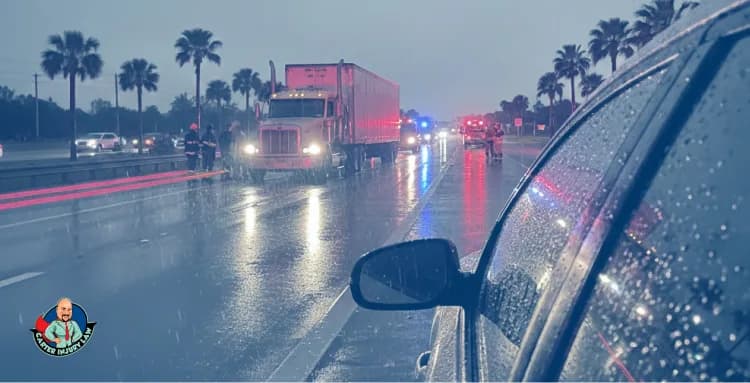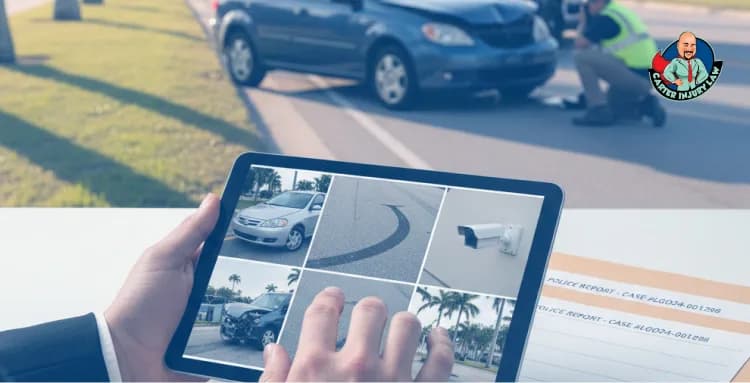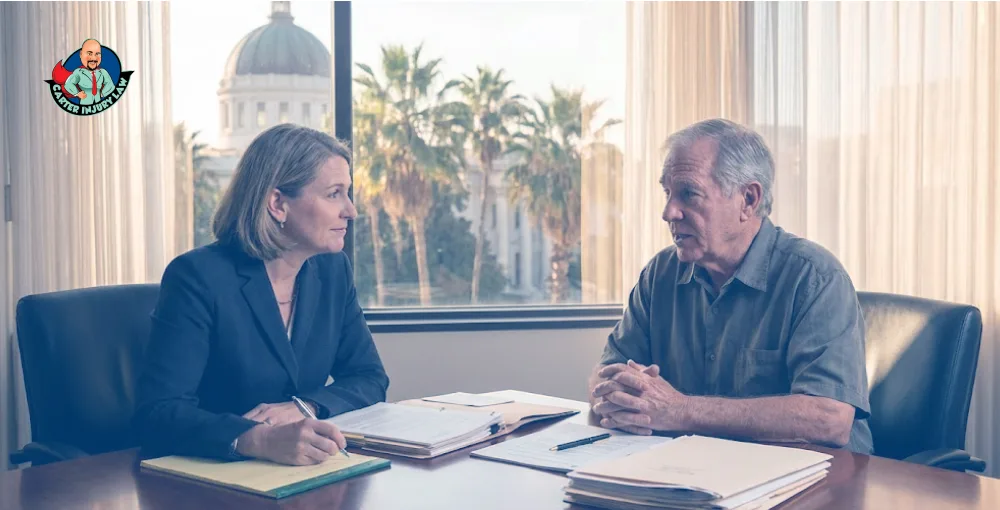Trucking accidents are rarely simple misfortunes. They are complex events that place drivers, companies, and even entire communities under extreme pressure. In my years at Carter Injury Law, I have seen how the moments immediately following a crash can decide whether a firm protects itself with dignity or stumbles into costly mistakes.
The law demands much from trucking companies; however, fairness also demands clarity. Drivers must act swiftly, managers must respond with order, and firms must understand that every decision made in those first hours carries consequences. Evidence can fade, regulations can be overlooked, and the difference between compliance and negligence can rest on the smallest of details.
It is in these moments that the question arises, not simply what must be done, but why it matters so profoundly…
(1) Immediate Steps After a Trucking Accident
When an accident occurs, the very first duty is simple yet vital, safeguard human life. Drivers must ensure their own safety, check on others involved, and summon emergency assistance without delay. A truck can be replaced, cargo can be recovered, but a life cannot be restored once lost.
Once the scene is secured, attention must turn to preventing further harm. Hazard lights, warning triangles, or flares must be deployed, and if the vehicle can be moved without creating additional danger, it should be guided to a safe position. These are not only acts of responsibility but also the foundations of sound legal defense.
In these early minutes, drivers also have the opportunity to begin preserving the truth. Photographs of the roadway, positions of vehicles, weather conditions, and visible damage will later prove invaluable. A calm word exchanged with a witness, a brief note written down, or a photograph taken may mean the difference between clarity and costly dispute.
Yet safety and documentation are not the only matters pressing upon a trucking firm. Beyond the flashing lights and scattered debris, there lies the weight of law. The driver, the company, and the industry itself are bound by strict reporting requirements, and it is here that the line between compliance and liability begins to sharpen…
(2) Legal and Regulatory Reporting Requirements
The law grants no leniency when it comes to reporting an accident. A trucking firm must notify the proper authorities without delay, beginning with local law enforcement. Their presence ensures the scene is managed with order, and their reports form the earliest official record of what transpired.
Beyond the local police, federal obligations cannot be ignored. The Department of Transportation and the Federal Motor Carrier Safety Administration both set clear thresholds for reporting. If an accident results in a fatality, an injury requiring medical treatment, or damage severe enough to disable a vehicle, a report must be filed promptly. Each state may impose additional requirements, and a firm that overlooks them risks fines, scrutiny, or even the loss of operating authority.
Timeliness and accuracy matter greatly. Regulators view delay as negligence, and insurers often follow the same reasoning. In my experience, the firms that falter are not those that failed to act, but those that acted too late or too loosely.
A report, however official, is but a skeleton. To defend against claims, to preserve truth, and to ensure fairness, that skeleton must be given flesh in the form of careful documentation…
(3) What Evidence Trucking Firms Must Collect
Documentation is not a chore to be left for later, it is the lifeblood of any defense. A trucking firm must gather every detail with care, for memory falters, but written records endure.
Drivers should begin with photographs, capturing the vehicles, the cargo, the road, and the surrounding conditions. Even a single skid mark or a shard of broken glass can later tell a story more compelling than testimony. Witnesses too are invaluable. A name, a phone number, or a brief statement taken at the scene may spare a company from long disputes months later.
Equally important are the records within the firm’s reach. Pre-trip and post-trip inspection logs, maintenance histories, and electronic logging device data often reveal whether obligations were met or neglected. Preserving such evidence shows diligence. I have seen strong documentation transform a precarious case into a firm defense, while the absence of it leaves even careful companies exposed.
Yet evidence alone cannot settle every matter. The way a firm communicates with its insurance company may decide whether protection holds strong or crumbles under pressure…
(4) Communicating With Insurance Providers
After an accident, insurance companies must be informed without delay. A timely and accurate report to your insurance provider is equally important as a call to law enforcement. Too many firms stumble here, either by waiting too long or by saying too much.
In my practice at Carter Injury Law, I've seen cases where a single careless statement to an adjuster derailed months of preparation. Drivers, often under stress, may speak with candor that later works against them. Managers too may be tempted to speculate, offering explanations that are neither certain nor required. The golden rule is simple, provide facts, not theories.
Insurance companies are partners in protection, but they are also businesses with their own interests. Every word spoken must be precise, and every document submitted must be exact. Firms that communicate in haste often find themselves in disputes over coverage, while those that proceed with patience preserve both trust and protection.
Behind the scenes, a company must turn its gaze inward, examining its own records, practices, and people. For while insurance companies weigh liability, an internal investigation reveals truth, and truth is the surest shield in law…
(5) Internal Investigation and Root Cause Analysis
Once insurance companies are notified, the firm’s true responsibility begins, to examine itself with honesty. The records kept within your walls, the training given to your drivers, and the maintenance logs of your fleet all come forward as witnesses in their own right.
I have stood before judges where companies arrived with incomplete inspection logs, only to see their defense falter before a single question could be asked. Courts are not swayed by excuses, they are persuaded by evidence. A missing document can do more damage than a dented fender.
A thorough review must include the driver's hours of service, pre-trip inspections, and compliance with company policies. Maintenance histories must be checked, for a single overdue repair can become the centerpiece of a claim. If cargo was involved, its securing must be examined, as load shifts are among the most common causes of severe accidents.
I often advise firms to engage counsel early in this stage. Certain findings, if handled improperly, may later be exposed in litigation. Protecting sensitive information under attorney-client privilege can make all the difference.
However, even as the investigation unfolds, one must never forget the human side of these events. Drivers and employees are not merely part of the record but also individuals under pressure. And it is here, in supporting them with care and wisdom, that a firm shows its true character…
(6) Supporting Drivers and Employees After an Accident
Accidents leave an imprint on those involved. Drivers and employees may feel shaken, anxious, or uncertain about what comes next. It is the firm’s duty, both moral and legal, to provide support with clarity and compassion.
Throughout my time at Carter Injury Law, I've noticed that companies that prioritize their employees' well-being fare much better in the long run. Medical evaluations, counseling, and reassurance are investments in safety and trust. A driver who feels supported is more likely to cooperate fully with investigations, document events accurately, and return to duty with confidence.
Legal guidance is often required in this stage as well. Drivers should understand their rights, and firms should ensure that support does not inadvertently compromise their position in ongoing claims. Balancing care with caution is an art every trucking company must master.
Yet support alone cannot prevent the next accident. While comfort and counsel help heal, the lessons of one incident must inform the safety of tomorrow.
(7) Building a Safer, More Resilient Trucking Operation
Accidents are rarely matters of “if,” but always matters of “when.” Preparedness, sincerity, and careful attention to post-accident procedures distinguish firms that recover with dignity from those that stumble under unnecessary burdens.
We guide trucking firms through these complexities, offering not only insight drawn from years of experience but also practical counsel designed to protect lives and livelihoods. We offer our services on a contingency fee basis, allowing businesses to receive expert legal advice without paying upfront expenses.
Ultimately, a firm that acts wisely today safeguards its reputation, strengthens its operations, and honors the trust of its drivers and employees. The question is not merely how to respond after an accident, but how to cultivate a culture of safety, foresight, and resilience that turns each challenge into an opportunity for improvement.
For those ready to fortify their practices and protect what matters most, the path is clear and the time to act is now.












